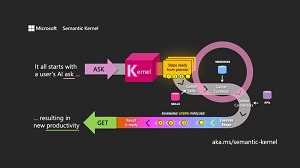Q&A
Crafting an AI Mixologist Using Semantic Kernel
What better way to learn about cutting-edge AI than creating a "copilot" assistant that can act as a mixologist, suggesting new cocktail recipes based on available ingredients?
A mixologist example is the perfect fit to learn more about Microsoft's Semantic Kernel because the SDK acts much like a mixologist itself, says Ron Dagdag, a Microsoft MVP in AI who manages software engineers.
"Semantic Kernel is like a mixologist who looks at available ingredients and crafts new cocktail recipes," said Dagdag, an R&D manager at 7-Eleven. "Semantic Kernel looks at different plugins, AI Prompts and memory stores to create an execution plan."
That's a great metaphor for what the SDK does, as Microsoft officially describes it as an orchestration layer for AI projects that lets developers define plugins that can be chained together to help integrate large language models (LLMs) including OpenAI, Azure OpenAI and Hugging Face with conventional programming languages such as C#, Python and Java.
 [Click on image for larger view.] Semantic Kernel (source: Microsoft).
[Click on image for larger view.] Semantic Kernel (source: Microsoft).
"What makes Semantic Kernel special, however, is its ability to automatically orchestrate plugins with AI," its GitHub repo explains. "With Semantic Kernel planners, you can ask an LLM to generate a plan that achieves a user's unique goal. Afterwards, Semantic Kernel will execute the plan for the user."
Those "special" planning and execution capabilities will be explained by Dagdag in an upcoming session at the Visual Studio Live! developer conference in Las Vegas in March. That's perfect timing, as Semantic Kernel just shipped as a release candidate and its bits should be well-formed and even tested in production use by then.
As the "Crafting an AI Mixologist Using Semantic Kernel" title suggests, Dagdag's intermediate-level session will teach attendees how the SDK and its API can be used to build a copilot creative enough to suggest new cocktails.
Specifically, they are promised to learn:
- When to use Semantic Kernel
- How to customize your own AI copilot
- The Do's and Don'ts in building a copilot
We caught up with Dagdag to learn more about his upcoming session in a short Q&A.
Visual Studio Magazine: What inspired you do present a session on crafting an AI mixologist using Semantic Kernel?
Dagdag: The idea came from noticing how bartenders mix ingredients to create unique cocktails. Similarly, Semantic Kernel in AI mixes different elements like prompts, plugins, and memory stores to craft innovative solutions. The aim is to show how this approach can lead to creative and practical applications in AI, like suggesting new cocktail recipes.
For those unfamiliar, could you explain what Semantic Kernel is and how it functions within the context of LLMs?
Think of Semantic Kernel as a "recipe maker" for AI. It combines different components like AI prompts, plugins (these are like tools or additional features) and memory stores (where information is kept) to direct the AI's responses and actions.
 "In the context of large language models, which are systems trained to understand and generate human-like text, Semantic Kernel helps in crafting more targeted and effective interactions."
"In the context of large language models, which are systems trained to understand and generate human-like text, Semantic Kernel helps in crafting more targeted and effective interactions."
Ron Dagdag, R&D Manager, 7-Eleven
In the context of large language models, which are systems trained to understand and generate human-like text, Semantic Kernel helps in crafting more targeted and effective interactions.
You mention learning 'when to use Semantic Kernel.' Could you give some examples of scenarios or applications where Semantic Kernel is particularly effective?
Semantic Kernel is great in scenarios where you need creative and tailored responses. For example, in marketing, it can help generate unique advertising copy. In customer service, it can provide personalized assistance. And, of course, in mixology, it can suggest innovative cocktail recipes based on available ingredients.
What are the key considerations and steps in customizing your own AI copilot using Semantic Kernel?
Key steps include defining the scope of tasks you want help with, feeding relevant data and prompts, and fine-tuning responses based on your specific needs. It's like training a personal assistant to understand your preferences and work style.
Could you share some of the 'Do's and Don'ts' in building a copilot? What are some common pitfalls to avoid and best practices to follow?
- Do's: Be clear in your prompts, regularly update the data your AI uses, and monitor its performance.
- Don'ts: Avoid overloading with irrelevant data, don't expect it to understand highly abstract concepts without proper context, and don't forget to review and adjust its outputs regularly.
- Don't Ignore Ethics: Be mindful of ethical considerations in AI development.
Lastly, beyond cocktail recipe suggestions, what other creative or practical applications do you see for AI copilots using Semantic Kernel? How do you envision this technology evolving in the future?
Beyond cocktails, these AI copilots can be used for personalized learning plans in education, creative content generation in media, and innovative product development in business. The technology could evolve to become more intuitive and adaptive, offering more personalized and context-aware suggestions in various fields.
This technology is evolving rapidly, and its applications are only limited by our imagination!
Note: Those wishing to attend the conference can save hundreds of dollars by registering early, according to the event's pricing page. "Register for VSLive! Las Vegas by the Year End Savings Deadline (Dec. 15) to save up to $500 and secure your seat for intensive developer training in exciting Las Vegas!" said the organizer of the developer conference, which is presented by the parent company of Visual Studio Magazine.
About the Author
David Ramel is an editor and writer for Converge360.